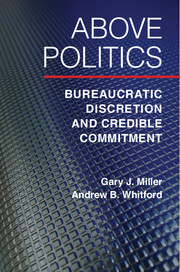Book contents
- Frontmatter
- Contents
- Preface
- Acknowledgments
- 1 Introduction
- 2 The Moral Hazard of Bureaucrats and Politicians
- 3 Political Moral Hazard and Credible Commitment
- 4 Political Moral Hazard and Bureaucratic Autonomy
- 5 “Above Politics”: The Separation of Powers and Bureaucratic Autonomy
- 6 The Control Paradox, Trust, and Leadership
- 7 Professionalism and Credible Commitment
- 8 The Politicization of Financial Regulation
- 9 The Financial Crisis and Reregulation
- 10 Conclusion: The Unraveling of Dodd-Frank
- Works Cited
- Index
- Other books in the series (Series List Continued from page ii)
1 - Introduction
Published online by Cambridge University Press: 05 May 2016
- Frontmatter
- Contents
- Preface
- Acknowledgments
- 1 Introduction
- 2 The Moral Hazard of Bureaucrats and Politicians
- 3 Political Moral Hazard and Credible Commitment
- 4 Political Moral Hazard and Bureaucratic Autonomy
- 5 “Above Politics”: The Separation of Powers and Bureaucratic Autonomy
- 6 The Control Paradox, Trust, and Leadership
- 7 Professionalism and Credible Commitment
- 8 The Politicization of Financial Regulation
- 9 The Financial Crisis and Reregulation
- 10 Conclusion: The Unraveling of Dodd-Frank
- Works Cited
- Index
- Other books in the series (Series List Continued from page ii)
Summary
CONFRONTATION
Many public officials regard U.S. senators as powerful individuals – especially so mid-level bureaucrats whose agencies are subject to oversight by those senators. On April 9, 1987, when four bureaucrats from the Federal Home Loan Bank Board (FHLBB) were summoned from their San Francisco office to Washington, DC, to face five U.S. senators, it should have been a simple matter of those elected officials flexing their senatorial muscle. Once the senators made their wishes clear, they would obviously expect the bureaucrats to defer readily to their requests on behalf of a constituent.
Moreover, the FHLBB, responsible for regulating savings and loans, was in an especially vulnerable position as the scope of what came to be called the “savings and loan (S&L) crisis” became clearer. Ed Gray, chairman of the FHLBB and the boss of the four summoned bureaucrats, had shown a great deal of deference to the same group of U.S. senators during a meeting held a week earlier. When asked later why he had accommodated the senators by flying the bureaucrats across the country for a second meeting, Gray answered simply, “Because they were senators. And I considered senators to be pretty powerful people” (Goldin, 1990). A close examination of the context reveals numerous reasons for the bureaucrats to be at least as deferential as Gray had been.
CONGRESSIONAL WEAPONS
The congressional dominance approach assumes that congressmen – or, more specifically, particular congressmen on the relevant committees – possess sufficient rewards and sanctions to create agencies that pursue policies of interest to the current committee members; those agencies that fail to do so are confronted with sanctions.
– Weingast & Moran (1983, 768)First of all, the senators were in a position to control critical funding for the FHLBB. The agency had sought funds from Congress for recapitalization of the Federal Savings and Loan Insurance Corporation; in the face of unprecedented thrift failures, the FHLBB would be hamstrung if Congress did not replenish the fund. To guarantee passage of the recapitalization bill, Chairman Gray had recently agreed to House Speaker Jim Wright's demands that Gray force beneficial S&L debt restructuring for a bankrupt borrower named Craig Hall. Gray acquiesced, and Wright, in return, allowed the recapitalization to come to a vote (Black, 2005, 96–97).
- Type
- Chapter
- Information
- Above PoliticsBureaucratic Discretion and Credible Commitment, pp. 1 - 23Publisher: Cambridge University PressPrint publication year: 2016

